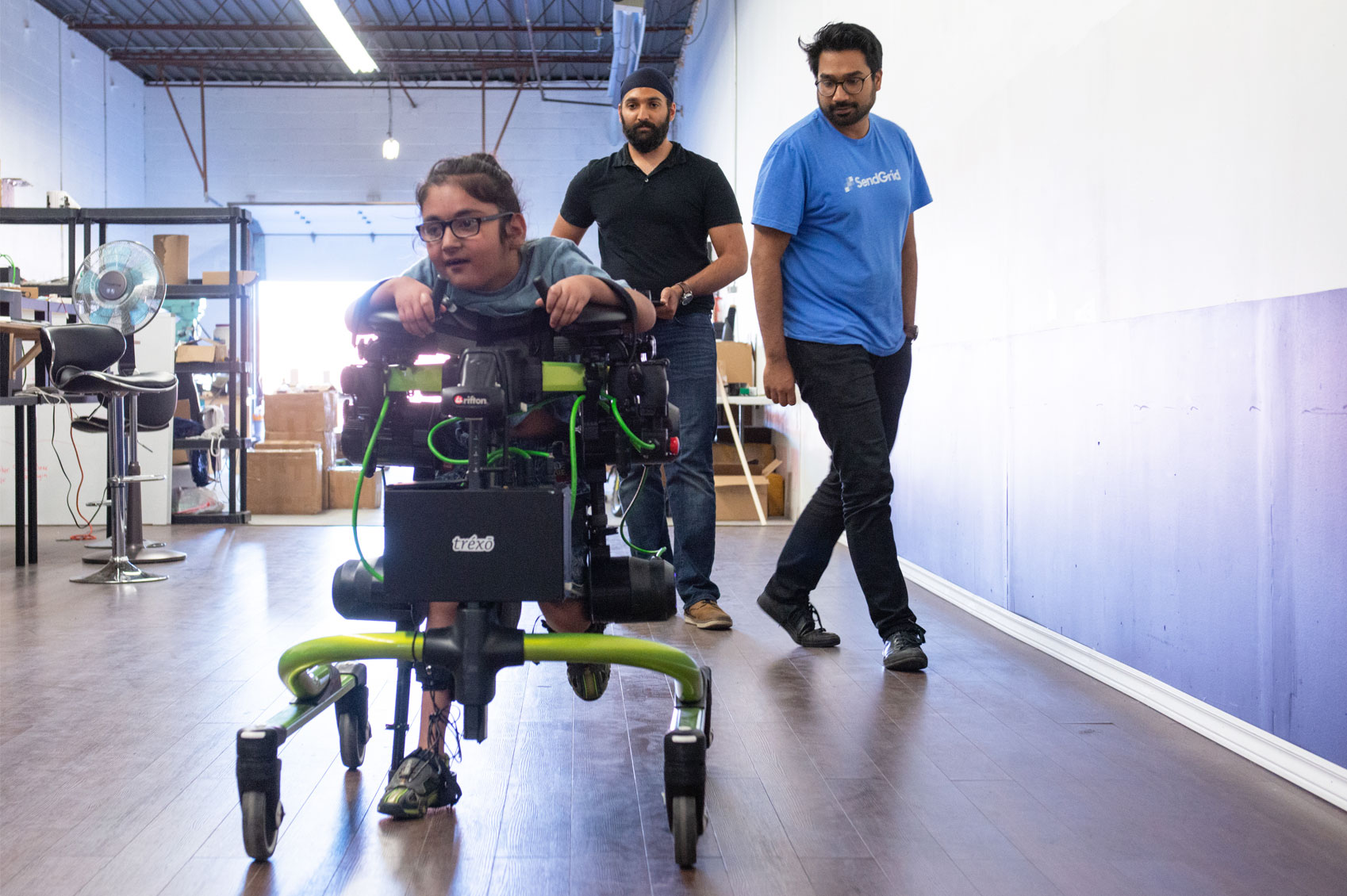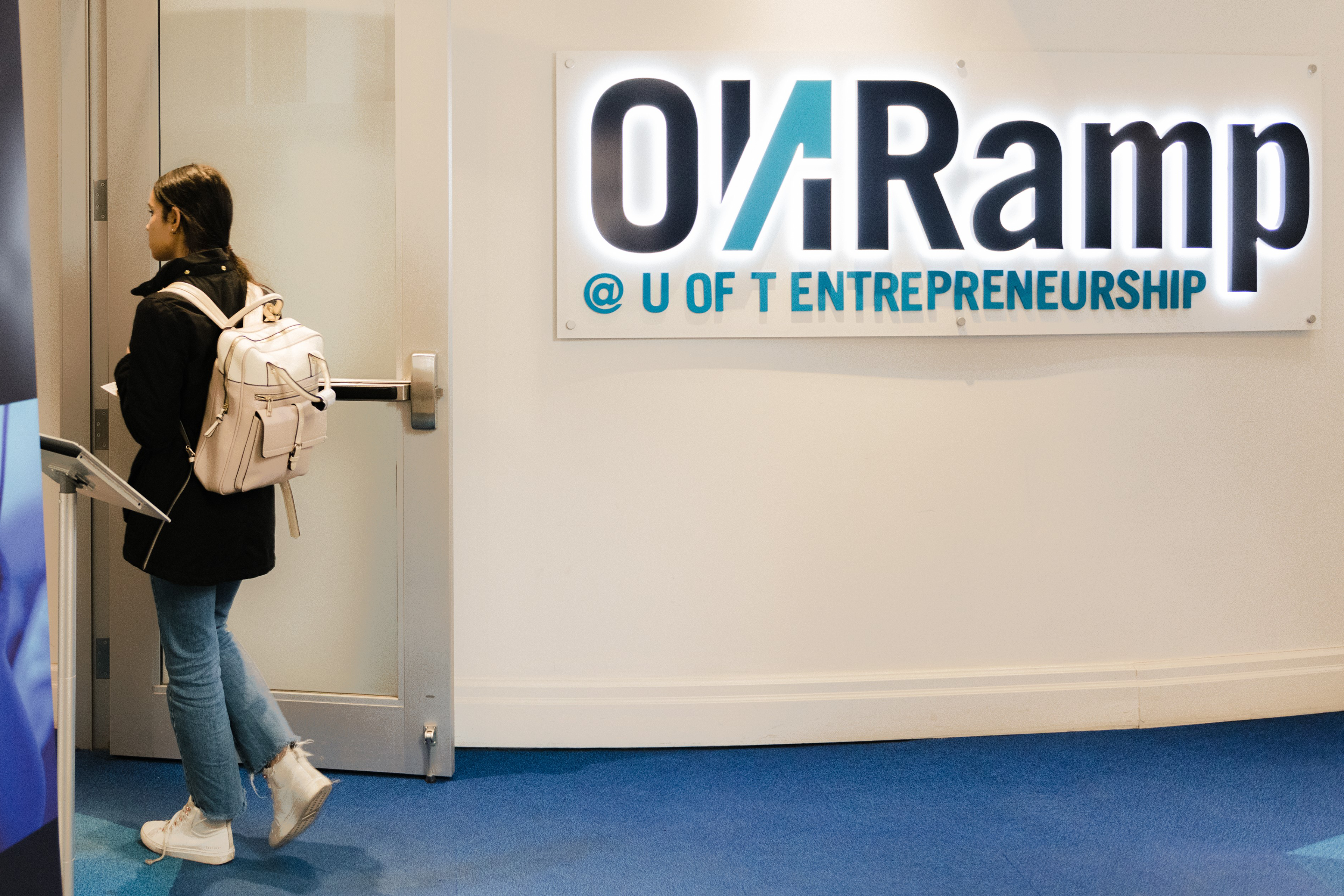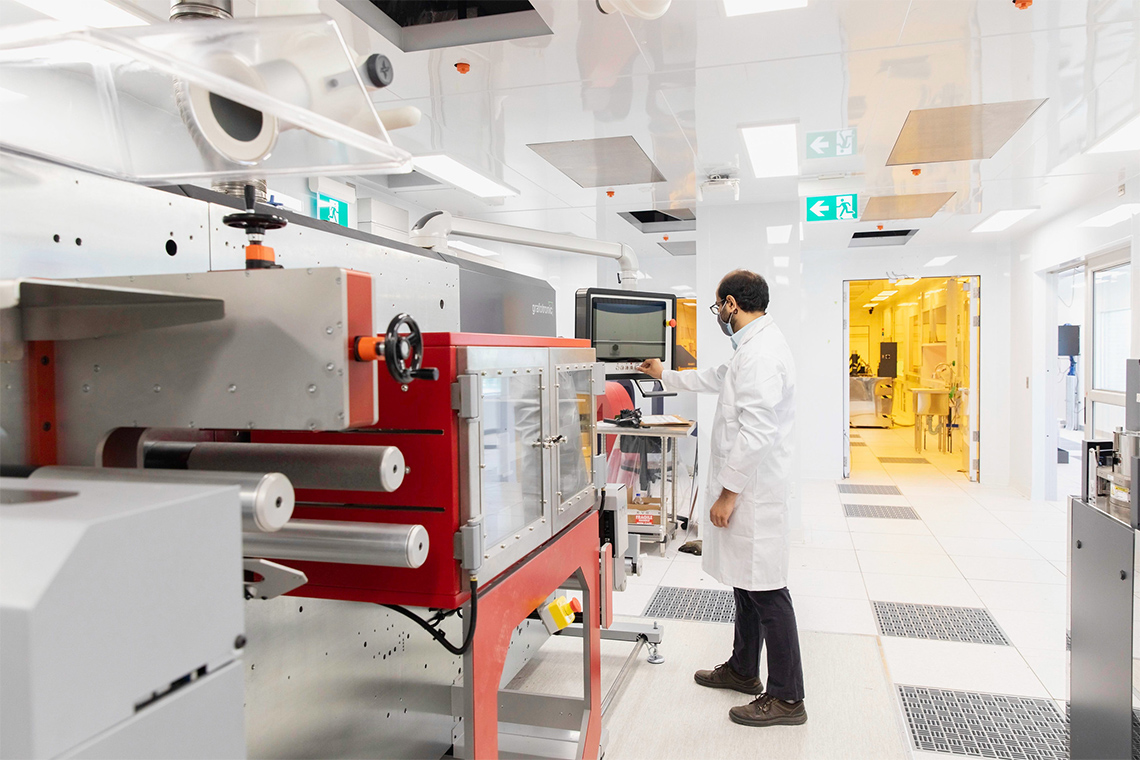A Commitment to the Management & Protection of Intellectual Property
U of T is where research and innovation excellence come together through a collaborative and entrepreneurial spirit. Innovation comes in many forms, follows many pathways, and emerges from many disciplines as U of T innovators tackle global challenges and solve real-world problems.
Our community of innovators and entrepreneurs share a passion for creating new knowledge along with a willingness to take risks to bring their ideas to Ontarians and the global community. To equip and enable the research, innovation and entrepreneurial community at the university the Institutional Strategic Research Plan identifies five strategic objectives that are informed by U of T's core research and innovation values, which includes a commitment to pursuing research and innovation that solve global grand challenges, and advance equity, diversity and inclusion. These objectives will inform and propel U of T’s research and innovation and performance measures over the next five year by doing the following.
- Lead nationally and globally in research and innovation
- Provide institutional supports to empower scholars to do their best research
- Enable, train and support the next generation of researchers and innovators
- Promote all stages of research from idea to discovery, translation and impact
- Cultivate an environment to leverage opportunities and foster collaboration and partnerships
The university is deeply committed to its public role as a leader in the discovery, preservation and sharing of knowledge. Commercialization and patent protection can be critically important to the process of turning ideas and innovations into new products and services, and are often valued by commercialization partners, entrepreneurs, and investors seeking to bring new innovations to the market. The university seeks to ensure all scholars are enabled to effectively identify intellectual property opportunities emerging from their research and provides institutional governance and support to effectively manage and protect IP when warranted.
The success of a university’s technology transfer efforts and related startup companies are critically dependent on private sector receptor capacity for early-stage innovations, access to risk capital, and domestic and international market opportunities. However, Canada and Ontario lag behind peer international jurisdictions in terms of private sector expenditures on R&D, lower levels of patenting, and reduced availability of risk capital. To help address these challenges, the university has fostered the development of a vibrant innovation community that provides mentorship, expertise, and networks for all stages of the innovation pipeline and provides the skills and resources entrepreneurs need to build and scale their businesses or to apply their experiences to business in the local economy.
U of T’s global reputation as a top research university attracts industry partners from Ontario, Canada and around the world. Over the last decade, U of T has worked with over 600 different industry partners. University scholars actively seek partners that can help advance university IP and to also co-develop new ideas and innovations that can be moved into domestic and global markets. These partnerships often include students and trainees, providing experiential learning and future employment opportunities.


Defined Roles & Responsibilities in Support of Commercialization
Commercialization and technology transfer are activities that turn early-stage knowledge and ideas into marketable products or services that create social and economic benefits. To support these activities, the IPO manages U of T’s portfolio of intellectual property and helps build successful relationships between industry, government, non-profit, NGOs and the U of T research community. Through the IPO, the University actively provides support to the innovation community, including Protecting Intellectual Property, and the overall Commercialization Process. Professional services available to the U of T community include the following.
- Advice on U of T’s Inventions Policy
- Receipt and evaluation of Confidential Invention Disclosures for technologies created at U of T
- IP protection
- Negotiating research and license agreements
- Legal resources
- Industry and partnership development
- Technology marketing
- Company creation and related professional services
- Networking support to secure partners, funding and commercialization
In addition to technology transfer services, U of T contains a vibrant entrepreneurship community consisting of 10+ accelerators operating across three campuses. These entrepreneurial initiatives accelerate ideas, people, social impact and new companies, while striving to create an inclusive environment that supports diverse and talented innovators across all disciplines. This entrepreneurship ecosystem with the support of University of Toronto Entrepreneurship provides mentorship, experiential learning opportunities, expertise, resources, and strategic connections to give students, alumni and faculty entrepreneurs the tools they need to effectively start, build and scale their businesses.

A Commitment to Increase IP Capacity, Education & Awareness
IP is a critical element of the global innovation economy. It generates value and wealth for individuals, companies and countries. Successfully protecting and leveraging IP is increasingly important for many entrepreneurs and their startups.
U of T has created an accessible, free IP Education Program designed to equip students, faculty and staff with a broad foundation in intellectual property and its various forms. This IP Education Program consists of two levels, Level 1: IP Foundations and Level 2: IP Strategy and Application and U of T students can receive recognition on their Co-Curricular Record upon completion. The university has made these materials freely available to educational institutions across the province, and beyond, to help equip the next generation of innovators in Ontario.
To further equip and assist U of T inventors, the IPO created the Inventor’s Guide to Technology Transfer at The University of Toronto which contains information on disclosing and protecting an invention, licensing considerations, helpful FAQs from the research community, and information on the professional services available to all U of T inventors.
Given the growing interest in entrepreneurship, a Startup Guidebook is available for U of T faculty, staff, and students interested in launching a startup company based on intellectual property developed at U of T. This handbook provides a broad overview of the start-up process from creating an incorporated business to seeking potential investors along with information and resources available to all U of T entrepreneurs.
The University annually tracks and publicly reports on a variety of innovation and entrepreneurship metrics in the Annual Report of the Division of the Vice-President, Research and Innovation, U of T’s Performance Indicators, and to the annual licensing survey of the Association of University Technology Managers.


A Strong Policy, Governance & Institutional Support Framework
U of T has a modern, flexible ownership Inventions Policy allowing U of T inventors to assume full responsibility for patenting and commercialization, or offer the invention to U of T and access direct support and assistance from the university. U of T actively promotes the innovation and IP services offered to our innovation community, including support throughout the process for the mandatory Disclosure of Inventions.
Through The Governing Council of The University of Toronto, formal policies are adopted and become binding across the institution. Originally adopted in 2008 and revised in 2013, the Inventions Policy at U of T outlines three key objectives.
- To encourage creativity and innovation within the University community
- To facilitate the translation of knowledge for the greatest possible public benefit, including by commercialization through development of inventions into commercial products or processes
- To ensure that revenue generated by these inventions is distributed in a manner consistent with the first two objectives and the advancement of research at the University
The Policy includes a definition of inventions which fall within U of T governance, a requirement for the mandatory disclosure of inventions by all U of T faculty, staff, trainees and students, and ownership and revenue sharing obligations.
U of T promotes IP opportunities to potential domestic and international partners through our Technology Explorer, a searchable database of market-ready innovations and companies and the DeepTechDownload which features investment opportunities and the latest news on research-based companies from U of T.
Since 2010, the University has supported the Connaught Innovation Awards with funding from the Connaught Fund to accelerate the development of promising technologies and to promote commercialization and knowledge mobilization. This program encourages applications from diverse sectors and backgrounds providing critical proof-of-concept funding to help accelerate ideas into impact.
The University also created the Toronto Early Stage Technology (UTEST) program to leverage our IP portfolio towards creating new companies based in Ontario. UTEST provides support to emerging entrepreneurs through a range of services including intensive entrepreneurial education, advisory support, opportunities to raise capital, and dedicated incubation space. The program operates in partnership with Toronto Innovation Acceleration Partners (TIAP), also receives financial support from the Connaught Fund, and provides companies with investment capital, mentoring, business strategy and incubation space.
In addition to UTEST, companies based on institutional IP can access any of the 10+ accelerators that operate across U of T’s three campuses and the 15,000 square feet of dedicated incubator space at ONRamp. ONRamp is an engaged and inclusive community providing entrepreneurs with access to facilities, events, and the business community in downtown Toronto.
Building & Supporting an Innovation Ecosystem
U of T has taken a leading role in building and fostering Canada’s largest innovation ecosystem. The University has been a key partner of the MaRS Discovery District, bringing together the innovation community to grow the economy and offering a range of high-value services that help high-growth companies succeed.
The University and the affiliated Toronto Academic Health Science Network of hospitals form one of the largest biomedical research clusters in North America and are the founding partners of the Toronto Innovation Acceleration Partners (TIAP) which specializes in venture building of early-stage health science technologies. The University has also sought to support the creation of organizations with deep commercialization expertise in areas of global research strength within the province. The University remains the institutional host of the Centre for the Commercialization of Regenerative Medicine which provides specialized expertise and investments to startup companies in cell- and gene-therapies, access to GMP cell manufacturing, regulatory support, and a global industry and partner network.
In another area of global strength, the University is a key partner of the Vector Institute for Artificial Intelligence which is driving research excellence and leadership to foster economic growth and improve the lives of Canadians. The University was also instrumental in supporting Johnson & Johnson’s innovation investment in Canada, JLabs@Toronto. This 40,000 square foot facility supports up to 50 life sciences technology companies at any given time and provides access to mentorship, investor networks, wet-lab facilities, and specialized equipment and instrumentation.


An Innovation Powerhouse
Research that feeds innovation, entrepreneurship, and commercialization is thriving at U of T. In all sectors and across our three campuses, our faculty, postdoctoral fellows, students and alumni are turning ideas into products, services, jobs, and companies that are contributing to the Ontario economy and improving lives around the world.
This Framework is focused on the commercialization of research knowledge created at an academic institution, but it is important to recognize that commercialization is one of many approaches to knowledge mobilization and impact. Numerous research outputs across disciplines spanning the life sciences, social sciences, humanities, physical sciences, education, arts and culture and beyond may not be suited, nor intended, for commercialization but inform new policies and practices, improve sustainability, elevate our quality of life, and enrich society in countless ways. U of T is known for its vibrant culture of innovation, research partnerships, and a multitude of collaborations with public- and private-sector organizations. International rankings place the institution among the top universities in the world and as a North American leader in the number of new intellectual property (IP)-based startups, invention disclosures, and licenses.
The University is also embarking on the creation the country’s largest university-based innovation facility. Through a $100-million investment and the largest gift ever to the Canadian innovation sector, the university constructed phase one of the Schwartz Reisman Innovation Campus, which will anchor Canada’s leading artificial intelligence (AI), biomedical and bioengineering research and innovation clusters. This facility is located next to Canada’s leading hospitals, the seat of the Government of Ontario and the MaRS Discovery District—at the heart of one of the world’s leading commercialization districts and Canada’s fastest-growing innovation ecosystem.
The University of Toronto (U of T) has forged deep partnerships with key Ontario organizations such as MaRS, the Ontario Centres for Innovation (OCI), the Center for the Commercialization of Regenerative Medicine (CCRM), Toronto Innovation Acceleration Partners (TIAP), Ontario Institute for Cancer Research (OICR) and other entities that support the commercialization of academic research.
The university was instrumental in bringing JLabs@Toronto to Ontario, which is the first JLabs launched outside of the USA. It has rapidly become a critical part of Ontario’s life sciences ecosystem providing support, mentorship, and wet lab facilities for emerging life-sciences companies.
In addition to connections with key Ontario organizations, the university has developed comprehensive entrepreneurship accelerator programming within the institution across all three campuses. In 2023, nearly 1,000 teams of students and entrepreneurs were supported through the Bridge@UTSC, Centre for Entrepreneurship, Creative Destruction Lab, Engineering Hatchery, Health Innovation Hub, Hub@UTSC, iCUBE@UTM, and INNOVED which are part of the community of 12 accelerator programs and initiatives at U of T. Collectively, over 700 companies have been created by the U of T community, raising over $3.5 billion in the last 10 years. U of T ranks in the top 5 globally for university business incubators in UBI Global’s World Benchmark Study of over 1,800 universities and institutions.
In terms of intellectual property (IP) management and support, the university created the University of Toronto Early-Stage Technology (UTEST) program, which leverages the research excellence of the university along with the institutional patent portfolio to create new Ontario-based companies. The UTEST program is connected to the Innovations & Partnerships Office to leverage the university’s patent portfolio across numerous sectors. In less than a decade, the program has emerged as one of Canada's top-ranked tech incubators and has helped propel the U of T to #1 in Canada and #3 among North American universities for the number of startups launched from institutional IP.
With the support of the Connaught Fund, hosted in partnership with Toronto Innovation Acceleration Partners (TIAP), and located in the Schwartz Reisman Innovation Campus, UTEST offers a range of services including intensive entrepreneurial education, advisory support, opportunities to raise capital and dedicated incubation space. The program is open to the entire U of T community of innovators and has more recently forged connections with the Toronto Academic Health Sciences Network (TAHSN) of affiliated hospitals. Since it was established in 2012, UTEST has created over 150 companies, which have raised over $800M in capital.
U of T is deeply committed to its public role as a leader in the discovery, preservation and sharing of knowledge. Since the discovery of insulin in 1921, the University has built a culture of discovery and innovation that has significant impacts and socioeconomic benefits within Canada and around the world.
To ensure researchers, innovators and entrepreneurs at the University are supported as they seek to protect their ideas, launch new companies and commercialize their research, the University created the Innovations & Partnerships Office (IPO) which serves as the first stop for questions, guidance and support to the U of T community. IPO manages U of T’s portfolio of IP and helps build successful relationships between industry, government, and the U of T research community. IPO’s expertise in licensing, start-up creation, business development, and legal matters help turn U of T innovations into products, services, companies, and jobs.
The University has also created over 10 Acceleration programs including the UTEST program to provide support to U of T entrepreneurs creating new IP-based companies. In partnership with Toronto Innovation Acceleration Partners (TIAP) and with the financial support of the Connaught Fund, UTEST provides companies with investment capital, mentoring, business strategy and incubation space at the University's St. George Campus. This multi-disciplinary “lab-to-market" program has created over 130 companies to date, which have collectively raised over $700M in venture financing and a combined (estimated) market capitalization of over $2.5B. The vast majority of these new companies remain active and head-quartered in the Greater Toronto Region.
U of T’s global reputation as a top research university also attracts industry partners from across Canada and around the world. Over the last decade, U of T has worked with over 600 different industry partners. These partnerships augment and enrich the training and research activities at the university and their impacts. The University seeks partnerships that help secure resources and tools (i.e., hardware, materials, software, and data) that expand the impact and scope of our research and discovery efforts, while also providing opportunities that prepare students for future careers and employment.

- Respond to general questions about U of T’s commercialization framework
- Respond to specific questions from U of T faculty members about how the framework applies to their research and activities




